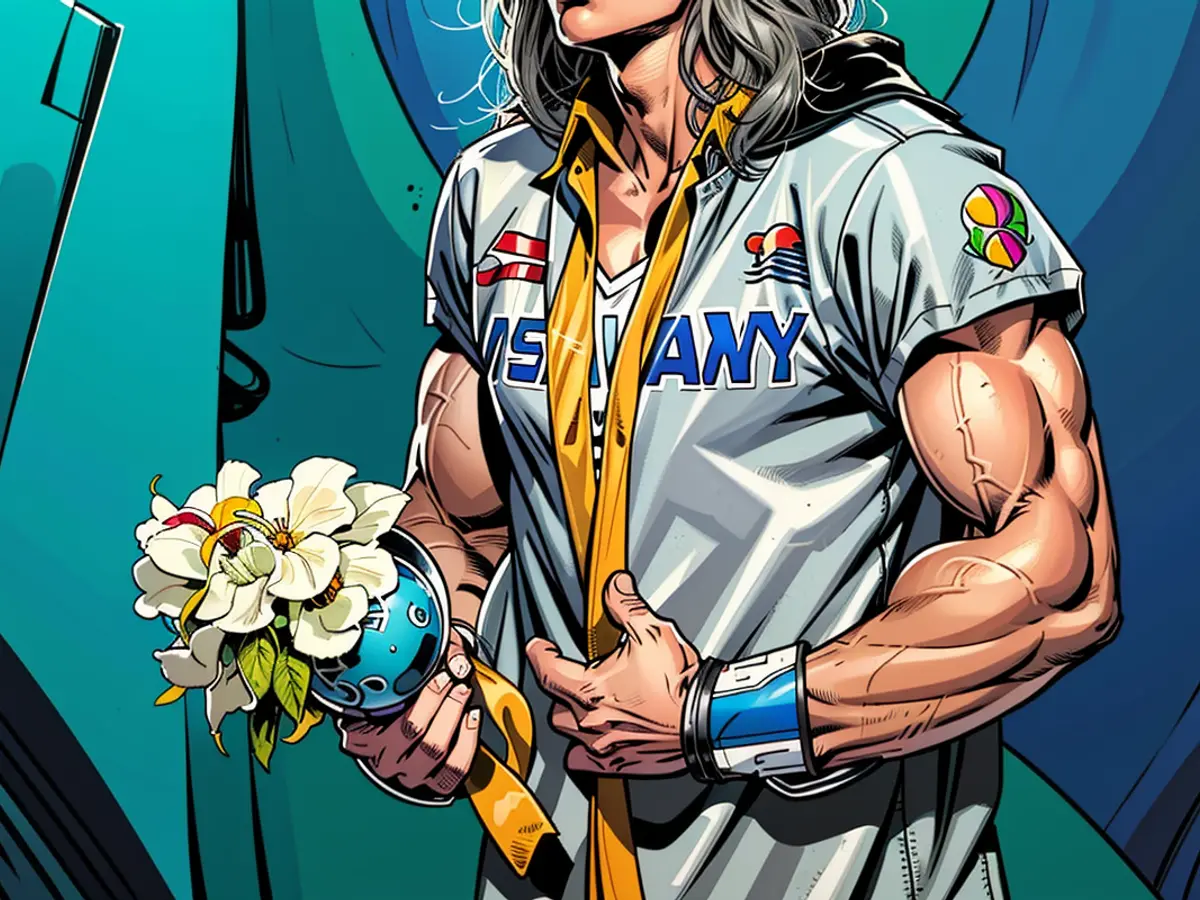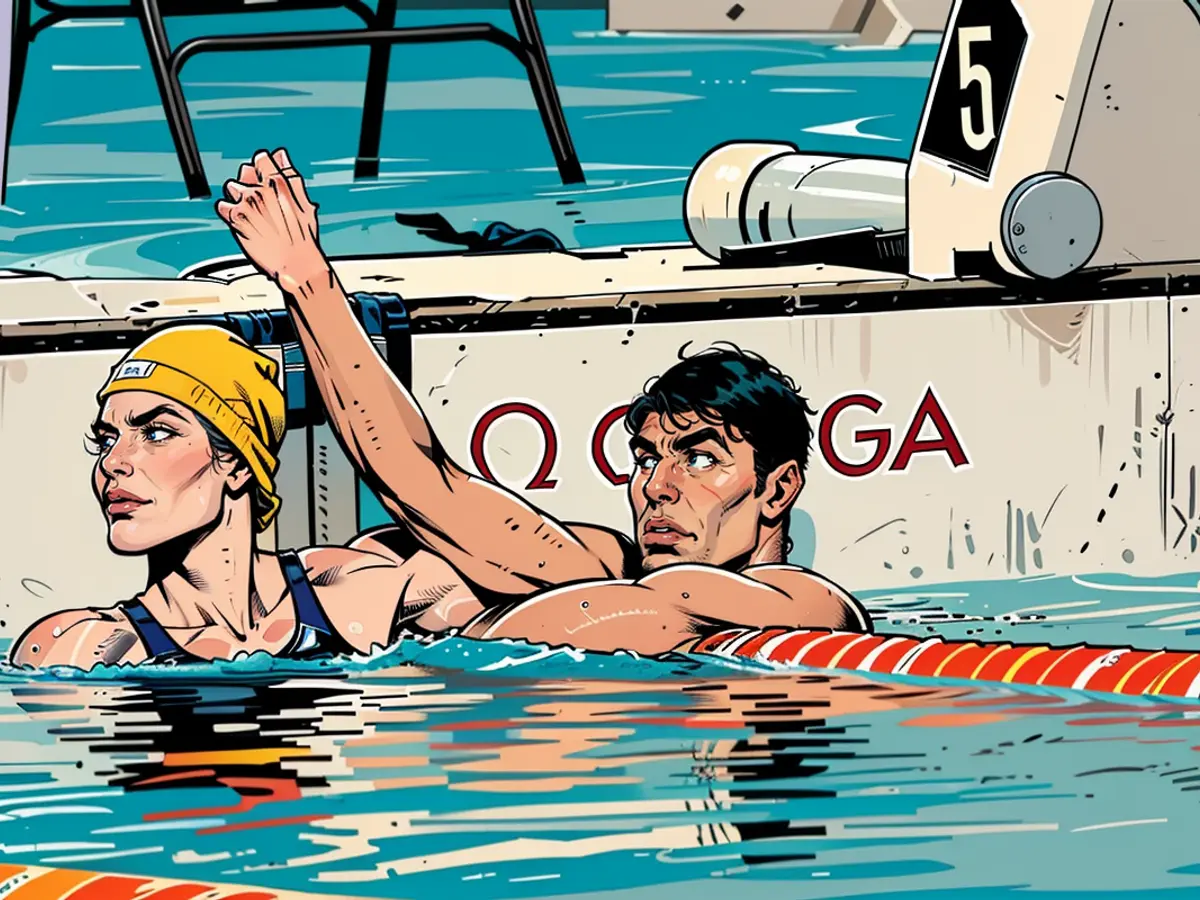I failed to anticipate the extent of the journey's duration.
ntv.de: In a few days, you'll be competing at the Paralympic Games in Paris. Unfortunately, you had to miss the last Paralympics in 2021 in Tokyo, your native Japan, due to depression. Care to share what transpired then?
Naomi Maike Schwarz: My withdrawal from the Tokyo Paralympics in 2021 wasn't a conscious decision, people may say I chose it, but truth is, I had no control over it. I was going through a tough time. I had trouble getting out of bed, and my mind was too clouded for high-performance sports.
Why was that?
I'm a very competitive person, and I've always put a lot of pressure on myself. I don't need a coach shouting at me to push harder. In fact, my coaches usually have to hold me back. I tend to overdo things. By 2021, all this pressure and ambition had built up inside me over the years. I was in therapy for three years before my breakdown. After that, I thought a stint in the clinic, followed by some rest, and things would be back to normal. But I grossly underestimated the length of the journey.
You're open about your depression. How have you learned to cope with this illness?
I'm still on this journey. It's a constant battle. Some days are harder than others.
What's been challenging for you?
Before, I could handle the pressure well, especially the pressure I put on myself. I'd feel stressed, but the moment I stepped on the starting block, I'd feel excited about the competition. I knew it was time to deliver. Now, even small everyday situations can overwhelm me. For instance, if a friend cancels or reschedules a meeting. Pressure triggers anxiety and fear instead of motivation.
What do you do to manage those feelings?
I try to remember the challenges I've overcome. At the same time, I put this journey in perspective with my performance.
How has this journey helped you return to competitive sports?
I've tried to make a comeback several times over the last three years. I'd get back into training, tell myself I was ready, but I'd often have to take a step back. It was a process of trial and error. I'd take a step back, wait, start again, work on it, try again, take another step back. That was my routine for the past few years. I underestimated how long this journey would be. I'm slowly getting back to a place where competitive sports are enjoyable again.
How do enjoyment and performance go hand in hand?
For me, they're intertwined. I wouldn't have achieved success in my career if I didn't enjoy swimming. But I have many days when fatigue, nervousness, or pressure gets the better of me. Sometimes I question why I put myself through this. But at the end of the day, swimming is what I've always wanted to do.
How did you get into swimming?
I come from an athletic family. Both my parents were competitive swimmers. When I was born, they were teaching at the German School in Tokyo-Yokohama. Before I could walk, I was already in our pool. My parents were worried I might drown, so they enrolled me in baby swimming classes. Even after we moved back to Germany, I never stopped swimming. And my first victories came at the age of six. Then, at age ten, I was diagnosed with Zapfen-Stäbchen-Dystrophie and lost my sight within a few weeks. I had to learn to swim all over again.
How did you cope with that?
Swimming is a visual sport where eyes are essential. For example, a coach might use hand signals. I had to find alternative ways to navigate and communicate.
What were those ways?
My coach learned to communicate with me verbally instead of visually. Or I'd always swim with someone in a group who could give me instructions. I learned to count strokes. It took time for my body to readjust to swimming. I had to rely on my feelings.
So, you've conquered the challenges of competitive sports before.
Yes. I always say it was lucky I chose swimming as my sport. Other sports like volleyball would have been much harder to learn again. In 2007, I attended my first swimming competition for the German Disability Sports Association with my father. At that time, the para-world was less known, partly because it wasn't as media-focused. I was fascinated by the para-world, but also overwhelmed.
What exactly overwhelmed you?
I had to accept that this is how it is, that my condition is likely to remain and might even worsen. But I quickly decided that I want to continue swimming, just in a different way. Even though I wasn't immediately enthusiastic, I'm incredibly grateful today. Para-swimming has opened many doors for me and given me things I could only have dreamed of.
This year, I nailed my comeback at the Swimming European Championships in Funchal in April, placing 4th in both the 100 meters backstroke and 100 meters freestyle. I even set a new German record of 1:15.27 minutes in the backstroke. I gotta say, re-entering the competitive sports scene and the pressure that comes with it, really got to me mentally. It's all part of my bag of issues. I tend to get overwhelmed easily. It's a touchy situation, and I had to figure out how to handle it again. So I'm a bit on edge about Paris, but I've learned from my past experiences and continued working on myself.
What have you learned?
(No additional text provided)
I've sought out some professional help in dealing with my depression and managing the stress of competitive sports. It's no walk in the park finding a balance. But I'm glad the European Championships went well since it showed me what areas I still need to focus on.
But doesn't the rehearsal have to go wrong for the show to be good? Was the European Championships a successful dress rehearsal for the Paralympic Games?
Yeah, it was a good warm-up. I'm currently feeling pretty nervous and excited for Paris. I want to soak it all up and be fully present for the experience. I hope I've built up enough mental strength to stay calm during the competition.
How are the preparations going?
I've had a bit of a dance when it comes to preparing for the Paralympic Games. It's been a lot of last-minute adjustments. My coach and I change up the plan based on my daily condition. Adjusting my therapy has been part of it too. I haven't found the perfect method yet. I'm just taking things day by day, trying to make the best of each situation.
What are you looking forward to the most?
I'm looking forward to every part of it. I remember the 2012 Games in London and the 2016 Games in Rio as unforgettable experiences. For two weeks, I get to live in a whole different world in the Paralympic Village. Surrounded by so many different athletes from various sports, it's like I'm meeting kindred spirits. That's special.
What are your goals?
I'm still trying to figure that out. Just being there is enough for me. Having the opportunity to participate was my motivation back in Rio. I had hoped to swim in the medal range, but it didn't have to be a medal. I unexpectedly ended up winning silver in the 50m freestyle. For Paris, I'm trying to keep my focus off of times and placements since I can't accurately assess my performance. I'm more like a wild card with infinite possibilities.
What comes to mind when you think of Paris now?
I'm thrilled that my husband, Carl-Louis Schwarz, and our family and friends will be there with me. Twelve people are joining me in Paris. I've got my own little support system there, so no matter how I'm feeling, I just need to look up and there'll be arms offering comfort and care. That puts a bit of pressure on me too. I'm both an athlete and a person who wants to perform.
A few days before your competition, your husband Carl-Louis Schwarz, who was also a swimmer, has a birthday. Will you celebrate his birthday in the pool?
Unfortunately, we won't be able to celebrate together in the pool because I'll already be in Paris. He'll arrive a few days later. His birthday is also our anniversary this year. Sadly, we won't be together on that day, but we'll make it up to each other afterwards.
Do you have any plans?
After the competition, we have a few days to explore Paris and unwind as a couple. After that, we'll pick up our dog Jumper and my parents' camper and drive through Norway. We plan to have a relaxed getaway together to process these wild past three years.
Naomi Maike Schwarz spoke with Rebecca Wegmann
Naomi mentioned that during her tough time leading up to the Tokyo Paralympics, she struggled with getting out of bed and had a clouded mind, which made high-performance sports impossible. (from the text)
Now, Naomi shares that even simple everyday situations can overwhelm her, causing pressure to trigger anxiety and fear instead of motivation. (from the text)









